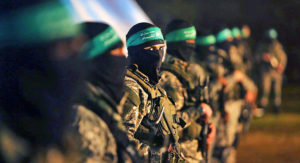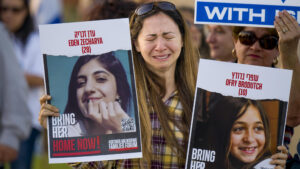It was hot and stifling in the corridors of Tel Aviv’s Ichilov Hospital. Hundreds of people queued for hours, but no one complained. It was the afternoon of October 7 and they were waiting to give blood.
Volunteers were also among the first to respond to Hamas’s brutal attack on the ground. The army was protecting Jewish settlers in the West Bank, and civilians were left to fend for themselves for several hours against frenzied killers. It was only late in the afternoon that soldiers started arriving, very gradually, some on their own initiative.
Six weeks on, Israel’s vast volunteer movement is still keeping the home front together, while domestic politics continues to deteriorate. In the nine months preceding Hamas’s murderous attack, Israeli society experienced the most challenging crisis in its history. For 40 straight weeks, hundreds of thousands of citizens — including Air Force and intelligence personnel — took to the streets to demonstrate against the hard-Right’s judicial reforms, and call for new elections. Netanyahu ignored them and continued on his path to dividing Israeli society and weakening the army.
When Hamas attacked on October 7, the nation faced war with a government it did not trust and a Prime Minister who was only concerned with remaining in power. Unable to rely on the state for leadership, ordinary citizens took matters into their own hands. Volunteer groups sprang up in every corner of the nation, based on the organisational frameworks that arose during the protest. In the first days of the war, for instance, the Brothers in Arms organisation set up a logistics centre in Beit Kama in the northern Negev. For a week, they were the only group operating in the high-risk Gaza envelope area.
The Brothers in Arms, founded during the protest, is largely made up of army reservists who served in combat units in the past, but are now over 45 years old and exempt from military service. Its mission was initially to get residents out of the conflict zones — and then to evacuate all the surviving residents because Hamas’s rockets continued to fall. The Brothers in Arms evacuated tens of thousands of civilians from the Gaza envelope to temporary housing, keeping together the remnants of communities that were suffering trauma, the loss of loved ones, and the kidnapping of relatives, even whole families. They were relocated to kibbutzim that provided for their basic needs, and offered a sense of community. All the while, the Government did nothing.
An additional logistics centre was set up in Tel Aviv, where volunteers helped evacuees who had left their homes with nothing but the clothes on their backs, giving out clothes, toys, books and baby food. A Tel Aviv restaurant provided 20,000 hot meals every day. The combination of superior organisational and technological skills, as well as the public’s willingness to volunteer and donate money, meant that the civilian response was far more valuable than that of the non-existent government.
It was not long before the evacuees from the Gaza envelope were joined by those from the city of Sderot, who came from an entirely different social stratum. These were the kind of people who supported the Government and believed it when it called Brothers in Arms “anarchists” and “traitors”. Yet now the Brothers are their saviours, having rescued them from rocket fire and terrorist attacks. “Why did they say you’re traitors?” said one of the evacuees. “You’re angels.” The residents of Sderot were relocated to the tourist city of Eilat, whose population has now doubled, and to additional cities with empty hotels. This operation was replicated when it came to evacuating communities along Israel’s northern border due to concerns of clashes with Hezbollah. About 150,000 citizens have been evacuated from their homes so far.
Israel has never had so many evacuees. In the 1948 war, 70,000 people were evacuated; some returned to their homes after the war, others were considered refugees and had to be resettled. There was a volunteer movement then too. But the Government was active, it stood at the helm, and did what needed to be done. This time, much of the process is being done from below.
But how long can this last? A country cannot run itself without a government. How long is it possible to house, feed and provide psychological treatment for evacuees without support from the state? Or send children back to school? Yes, the hotels have substantially reduced the cost of accommodation, and the kibbutzim even more so, but this is a project that requires funding at a scale that no voluntary organisation can withstand.
The Government makes promises to pay for accommodation and living expenses for evacuees, as well as to make up for lost income, but ministers have so far been reluctant to hand over the funds. Their attitude contrasts starkly with the civilians who are volunteering to harvest the abandoned field crops and pick the ripening fruit in the Gaza envelope and along the northern border. The Thai workers who used to do this have either returned to Thailand, been killed or were taken hostage by Hamas in Gaza. Meanwhile, the Foundation for the Welfare of Holocaust Victims is more active than ever before, assisting the remaining 100,000 survivors. Likewise, dozens of civilian organisations are helping the evacuees, providing psychological counselling and teachers, or setting up kindergartens for people whose world fell apart overnight.
Amid this outpouring of warmth, government ministers are refraining from visiting the evacuees and attending the funerals of those killed, reluctant to face the public’s wrath. During the 1973 Yom Kippur War, by contrast, then-Prime Minister Golda Meir visited the wounded in the hospitals, the soldiers on the front lines, as well as bereaved families. She accepted their anger with a bowed head, and she was never ashamed to weep when facing a seriously wounded soldier. Netanyahu, by contrast, does not dare show his face, and his ministers have vanished without a trace. The families of the kidnapped had not had a proper meeting with the country’s leadership before last Tuesday.
Instead, the Prime Minister is preoccupied with his political future. While the fighting is still ongoing, he is agitating against the heads of the army and placing full responsibility for October 7 on them. Unlike the generals who have admitted their fault, and announced they will be stepping down once the war is over, he still refuses to acknowledge his responsibility as the person at the top.
Sometimes, a crisis brings a new beginning. We can only hope that, after the war, the patriotic devotion to the greater good we have seen in Israel’s volunteer organisations will formulate a new social and political order — staffed by leaders who have the will and the courage to put their citizens first.
Disclaimer
Some of the posts we share are controversial and we do not necessarily agree with them in the whole extend. Sometimes we agree with the content or part of it but we do not agree with the narration or language. Nevertheless we find them somehow interesting, valuable and/or informative or we share them, because we strongly believe in freedom of speech, free press and journalism. We strongly encourage you to have a critical approach to all the content, do your own research and analysis to build your own opinion.
We would be glad to have your feedback.
Source: UnHerd Read the original article here: https://unherd.com/




